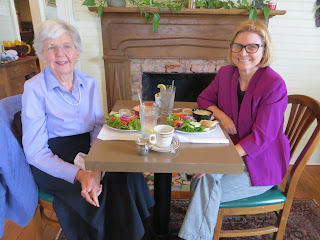Tomorrow begins chapter 10 of my life. Yes, I do think in chapters: birth to school age, grades 1-8, high school, college, Sparta, seminary, WRHS, RCCC, retirement, and tomorrow will open page 1 of the Staunton chapter.
So many songs about change - probably because change can bring such a harvest of emotions. In the past two weeks I have packed all my material belongings in 100+ boxes, hauled 4 carloads of trash and recycling and 4 to Goodwill, sold 20+ large items on Facebook Marketplace, given items away to friends, and Habitat came to pick up some donations. Physically I have worked harder than I’ve worked since building houses in Honduras when I was 25 years younger. Emotionally I am the proverbial roller coaster. One day I’m whistling happy tunes with every packed box; the next, I’m heavy hearted with leaky eyes.
How I have loved my life in Salisbury. 33 years. 3 chapters. I have lived here longer than everywhere else added together. How I will miss my house: the Japanese maple I planted as a sapling, whose dramatic seasonal changes keep me awestruck; my quiet screened in deck where I sit at the edge of the woods communing with the cardinals, robins, wrens, and squirrels, and delighting at the red-shouldered hawk, barred owl, downy and red-bellied woodpeckers, and patter of rain on the tin roof. How I will miss my dear First Pres family: the loving relationships that have healed my soul, the special memories that will ever be a well of joy.
And how I will miss the physical nearness to the dearest friends imaginable - the walks in the park, the lunches, the tea times. Friends and family are forever. We will plan visits - to look for dolphins and herons; to eat Katana, Sabaidee, and LA Murph’s; to show you around my new town; and we will use phone calls, social media, and Facetime to stay close between visits. Please please please, all friends and family, plan your nearby travels to cut through Staunton and stop over - I will love that!
Chapter 10 is unwritten, blank pages without words or numbers. I go with a sense of excitement, as Staunton has been a beloved second home for some 21 years. I love the fresh mountain air, the view of the mountains from my new back deck, and the healthy eating options that cater to my food intolerances. Beyond that, God only knows. I will turn each page as it comes, try to live each moment, to fully be wherever I am. Where will I fit in my new church, in my new community? Which strangers will grow to be friends? What good trouble will I find? Chapter 10, page 1, tomorrow.







